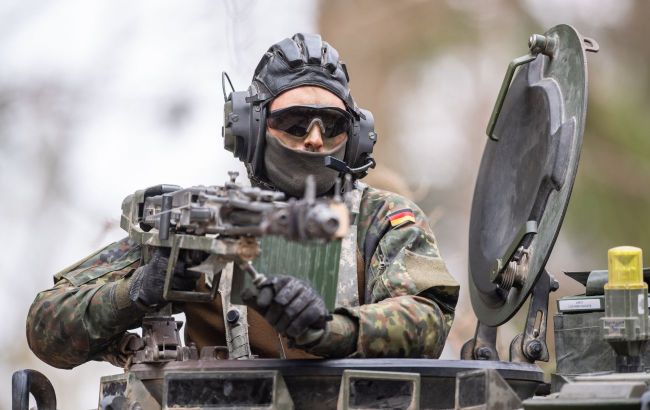Germany expands army amid threats of Russian attack
 Photo: Germany focuses on new NATO goals (Getty Images)
Photo: Germany focuses on new NATO goals (Getty Images)
The German army has set a goal of increasing the number of military personnel from 62,000 to 100,000 by 2029 to meet new NATO requirements and improve readiness for threats from Russia, Reuters reports.
"It is imperative for the army to become sufficiently ready for war by 2029 and provide the capabilities Germany pledged (to NATO) by 2035," wrote German Army Chief Alfons Mais in a letter dated September 2 addressed to Chief of Defense Staff Carsten Breuer.
He stated that achieving these goals is impossible given the current number of personnel, which also includes 37,000 inactive military personnel.
Germany has already begun to increase its commitments to its allies in Eastern Europe, in particular by establishing a German brigade in Lithuania, which will number about 5,000 troops, and by deploying naval patrols in the Baltic Sea to counter submarine sabotage.
Mais called for an increase in active troops by about 45,000 by 2029, when NATO leadership estimates that Russia will be capable of launching a large-scale attack on its Western allies.
The head of the German army also stated the need to increase the number of troops by another 45,000 by 2035. This is necessary to achieve NATO's new goals and create reserves for a war of attrition similar to the one Russia is waging against Ukraine.
At the same time, Mais called for an increase of 10,000 troops to strengthen territorial defense.
A representative of the Ministry of Defense in Berlin declined to comment on the document, citing its confidential nature.
He said NATO had adjusted its capability goals in response to significantly increased threats following Russia's full-scale invasion of Ukraine in 2022:
"According to a first rough estimate, a total of around 460,000 personnel (from Germany) will be necessary, divided into some 260,000 active troops and around 200,000 reservists," Mais said.
In June, German Defense Minister Boris Pistorius announced that Germany would need up to 60,000 additional active military personnel in all branches of the armed forces to meet NATO's new targets, bringing the total strength of the German armed forces, the Bundeswehr, to around 260,000 in the future.
However, according to the Ministry, they have not yet reached the target of 203,000 military personnel set in 2018, and still have a shortage of about 20,000 regular military personnel.
On September 11, Germany tested its sirens for the first time in a long time to warn the population of danger. By the end of the year, Berlin plans to activate 450 sirens.
The German army has developed a strategic document in which it defines Russia as an existential threat to Germany and Europe as a whole.

